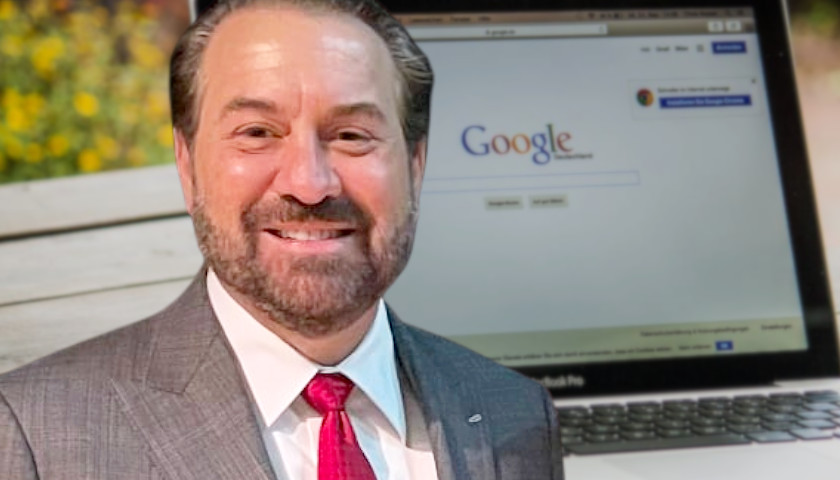After over two years of litigation led by Arizona Attorney General Mark Brnovich for “deceiving consumers” by tracking their location on smartphones without their knowledge and then selling the information, tech giant Google has settled, agreeing to pay the state $85 million.
Brnovich is the first attorney general in the country to sue Google over the practice, telling The Arizona Sun Times, “Google knew more about where you were going and who you hung out with, more than your travel agent or spouse,” he said.
That, he said, is what prompted him in part to file the complaint was the shocking extent of how much personal information was obtained. He found out about the practice after a news article revealed that Google was tracking users through its app preloaded on Android smartphones even after they’d disabled their “Location History” setting.
Brnovich told The Sun Times, “If someone hid a tracking device on your car without your permission, you would be understandably outraged, and that would capture just a fraction of the information that’s being collected off your phone.”
The AG expressed similar concerns about Google during an appearance on the Sara Carter Show last year. He said he’d discovered that even Google employees were concerned about its practices, which he found “Orwellian.”
He told Carter, “We’ve read information that for the average person to try to opt out to not have all them tracking old stuff, it would require the equivalent like a college degree and about 75 minutes of time to do all that. So they have made it virtually impossible for them not to collect as much information about you,” he said.
Brnovich’s lawsuit against Google may be part of a trend of using the legal system to combat what is seen by many on the Right as unfairness and overreach by Big Tech. The Arizona AG took on Facebook last fall, asking U.S. Attorney General Merrick Garland to open an investigation into the social media giant and find a way to “stop its active encouragement and facilitation of illegal entry.”
Brnovich tweeted, “This is another example of how out of touch Big Tech is with America. The cartels are seizing control of our southern border, and shame on anyone who is exploiting this crisis to enrich themselves.”
Facebook's alleged active facilitation of illegal entry is another example of how out of touch Big Tech is with America.
The cartels are seizing control of our southern border, and shame on anyone who is exploiting this crisis to enrich themselves. https://t.co/wN9Fo8cTBL
— Mark Brnovich (@GeneralBrnovich) October 19, 2021
In July 2021, former President Donald Trump led class action lawsuits with the America First Policy Institute against Google, Facebook, and Twitter, alleging free speech violations for censoring users. Two of the cases were dismissed earlier this year by the Eleventh Circuit Court of Appeals for lack of jurisdiction, prompting appeals by Trump.
Trump’s appeals may not succeed, if PragerU’s recent lawsuit is any indication. The media platform, which produces videos promoting conservative values, lost its lawsuit against Google and YouTube for censoring its videos in 2020, after a Ninth Circuit Court of Appeals panel ruled against the organization’s appeal 3-0. PragerU filed the complaint after YouTube placed some of its videos on “restricted mode,” which prohibits children under 18 from viewing them. Many of PragerU’s videos are educational and aimed at students.
In their lawsuit, PragerU alleged violations of free speech as well as unfair competition and advertising under California’s Lanham Act. The nonprofit’s founder, Dennis Prager, declared that the company’s “videos are presented by some of the finest minds in the Western world, including four Pulitzer Prize winners, former prime ministers, and professors from the most prestigious universities in America.”
The Ninth Circuit panel held that YouTube is a private entity, not subject to the First Amendment, so it didn’t qualify as “state action.” PragerU is unlikely to prevail at the Supreme Court, since a 2019 case decided by the highest court, Manhattan Community Access Corp. v. Halleck, held that “merely hosting speech by others is not a traditional, exclusive public function and does not alone transform private entities into state actors subject to First Amendment constraints.”
Some lawsuits against Big Tech are still ongoing. Rumble, the conservative video-platform alternative to Google-owned YouTube, sued Google in 2021 for violating antitrust laws by favoring YouTube results over videos from Rumble. A California judge denied Google’s requests to dismiss the lawsuit in June.
In May, the attorneys general of Missouri and Louisiana filed a lawsuit against the Biden administration, alleging officials “pressured and colluded” with Big Tech companies to squash stories about Hunter Biden’s laptop and the origins of COVID-19.
The Supreme Court will hear a case this term deciding the scope of tech companies’ immunity under Section 230 of the Communications Decency Act. Many — especially conservatives — upset with Big Tech censorship have argued that this provision should not shield them from lawsuits related to content shared by users on their platforms, since the companies take an active role in censoring the content. Gonzalez v. Google, filed by the family of a woman killed by ISIS, alleges that algorithms on Google’s YouTube site promoted videos featuring ISIS, arguing that that is not the type of conduct that Congress intended to shield with Section 230.
– – –
Rachel Alexander is a reporter at The Arizona Sun Times and The Star News Network. Follow Rachel on Twitter. Email tips to [email protected].
Photo “Mark Brnovich” by Mark Brnovich.





